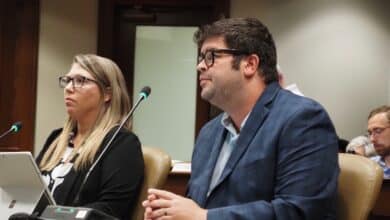By David Ferguson
for Conduit for Action
The Arkansas Freedom of Information Act (FOIA) gives you the right to attend most governmental meetings and to inspect most government documents.
Your rights under the FOIA have been under attack by politicians and bureaucrats from the very beginning when it was passed in 1967. The attacks on the FOIA dramatically increased in 2023 when in the regular session and special session of the legislature there were attempts to pass sweeping changes limiting your rights. Defenders accurately described the legislation as attempts to gut the FOIA.
The bills were beaten badly, which you might think would deter future attempts to gut the FOIA; but Governor Sarah Sanders and some legislative leaders have indicated their fight to change the FOIA is not over.
A group of Arkansans have vowed to protect the FOIA by putting the FOIA law in the Arkansas Constitution to keep politicians from changing it without a vote of the people. They are planning a petition drive to get the issue on your November 2024 ballot.
It is clear the FOIA needs protection.
I think those involved in drafting the proposed constitutional amendment are already aware of how difficult this project will be. I make that assumption based on organizers’ statements that they must get the drafting right because this will be their only shot at protecting the FOIA through the constitution.
For over three decades, I wrote bills and constitutional amendments as an attorney for the Arkansas General Assembly. Based on my experience I can say the drafting of a FOIA constitutional amendment will be a difficult task. I want to let you know about some of the difficult choices the drafters will have to make.
DON’T SET EXEMPTIONS IN STONE
Some people involved in the project have said the goal is to “enshrine” (or set in stone) the FOIA, as it now exists, into the Arkansas Constitution. My greatest concern is doing this also sets in stone FOIA exemptions that keep information secret from the people. It shouldn’t take another constitutional amendment to repeal exemptions in the future.
I suggest the drafters consider allowing the Arkansas General Assembly to repeal FOIA exemptions by a law passed by a majority of the Arkansas General Assembly. Similarly, I suggest that the legislature be allowed to pass laws giving the people additional rights to government information, but not let the legislature pass any law limiting our protections. In other words, don’t let the FOIA be limited except by a vote of the people, but allow FOIA protections to be expanded by law.
EXEMPTIONS OUTSIDE THE FOIA LAW
The Freedom of Information Act is found in Title 25, Chapter 19 of the Arkansas Code Annotated, but there are many laws outside of that chapter that modify the FOIA. The drafters must decide how to deal with those laws.
I did a quick search for laws containing the words “freedom of information.” The search showed about two hundred laws outside of the FOIA chapter that reference freedom of information. Some of those laws merely state that a newly created state agency is subject to the FOIA, but many of the references create FOIA exemptions without ever amending the FOIA chapter.
It gets worse. There are also laws outside of the FOIA that create FOIA exemptions without ever mentioning the words “Freedom of Information Act.” Some of those statutes merely say an agency’s actions are exempt from “25-19-101 et seq.,” which is the reference to the FOIA. This tactic was used by some legislators to make it harder for FOIA proponents to spot bills creating new exemptions. The deceptive tactic of passing FOIA exemptions outside the FOIA without using the words “freedom of information” was so prevalent that some frustrated legislators passed a law in 2009 requiring bills creating exemptions outside of the FOIA chapter to use the words “Freedom of Information Act.” [i]
I haven’t researched the matter, but there is also a possibility some FOIA exemptions exist that simply state some information is “confidential” and never mention FOIA or reference its statute number.
The drafters of the constitutional amendment will need to consider how best to deal with the exemptions appearing outside the FOIA chapter.
PRESERVE CURRENT LAW OR MAKE NEEDED IMPROVEMENTS?
Some FOIA supporters say their goal is to enshrine or preserve the current law by putting it in the constitution. Others say the constitutional amendment needs to include changes to strengthen it. For example, some advocates have mentioned the need to make changes because of court cases they say muddy the waters.
Here is the dilemma for the drafters. Sticking to current language is much easier to explain to the public and to defend, but advocates see the need for strengthening the FOIA. If changes are made to the current law, it will be much easier for bureaucrats to raise red flags about new provisions which they will then claim go overboard in disrupting government operations. Which way should the drafters go? Only repeat the existing FOIA, or make changes to strengthen it?
If the drafters decide to include changes to strengthen FOIA, they must be extra careful to be able to limit the changes to as few changes as possible so the changes can be easily explained to the public. They need to be able to easily list the changes and show through a markup copy exactly where the changes are made.
HOW MUCH LANGUAGE TO INCLUDE
In drafting the proposed constitutional amendment, it may be tempting to only propose some broad principles about FOIA rights, instead of repeating the entire FOIA. The problem with doing that is those broad statements may cause the FOIA to be interpreted in ways no one anticipates.
Repeating the entire FOIA is the much safer method, but the drawback to repeating everything is it will be a long amendment and that makes it easier for opponents to attack.
Another way to go about drafting is to only include key provisions of the FOIA in the amendment and then just reference other parts of the current FOIA statutes without repeating them. To me this is the worst option and likely would cause much confusion.
For example, there are some amendments to the Arkansas Constitution that reference the Arkansas Gross Receipts Tax (sales tax). Doing so means when the sales tax law changes it modifies the sales tax levied under the constitution. That is okay when dealing with the sales tax, but I don’t think you want a constitutional amendment on FOIA to be changed that way. Also using the sales tax as an example, if the legislature were to repeal the Arkansas Gross Receipts Tax and adopt a new sales tax law, the sales tax referenced in the constitution would no longer exist and the sales taxes in the constitution would become meaningless. Referencing statutory laws in the constitution is generally a bad idea.
Also consider the confusion created when a constitutional amendment on ethics proposed by the General Assembly was passed by the people. It took a few sections from Arkansas’ ethics law and put them in the constitution. Now we have the confusing situation of having a constitutional amendment that relies on some statutes, and we have statutes and some sections of the constitution addressing the exact same subject.
The FOIA constitutional amendment needs to be as clean and clear as possible.
WILL A CONSTITUTIONAL AMENDMENT PROVIDE FULL PROTECTION OF THE FOIA?
Putting the FOIA in the constitution will provide much protection of our rights to government information. But it can’t provide absolute protection. The public will still have to remain vigilant.
Remember, the General Assembly has the upper hand when it comes to proposing constitutional amendments. First, measures initiated by the people take lots of money and effort to pass. Second, over the past several years the General Assembly has pushed laws and constitutional amendments to try to make it harder for citizens to propose a constitutional amendment. At least one of those laws has passed. While I doubt the effectiveness of that law in modifying the constitution, it is the law until overturned by the court.
Third, the General Assembly can propose three constitutional amendments at each general election, and this gives the legislature many opportunities to change the constitution. Also consider the fact some legislative proposals have had deceptive ballot titles. Do you recall the deceptive Amendment 95 which was sold to the public as strengthening the ethics laws. It improved some parts of the ethics law, but not every ethics change was an improvement. The ballot title also said the amendment was establishing term limits when it was actually weakening term limits, and many voters were fooled. The point is, just like with Amendment 95, some future constitutional amendment proposed by the General Assembly could emphasize some improvement to the FOIA, while at the same time including provisions to weaken it, and the pubic could be fooled again.
Even if the FOIA is put in the Arkansas Constitution, you can’t let your guard down.
IS THERE ANOTHER WAY TO PROTECT THE FOIA?
If done right, a constitutional amendment is probably the best solution, however, that does not mean it is the only solution.
The people can propose a constitutional amendment or an initiated law. A law initiated by the people cannot be amended by the legislature except by a two-thirds majority. That is more protection than the FOIA has now. The FOIA as it exists now can be amended by a majority vote of each chamber. Passing an initiated act to repeal the current FOIA and replacing it with a new FOIA gives some additional protection, while avoiding some of the potential pitfalls mentioned concerning the drafting of a constitutional amendment.
One other item that could be a factor in deciding between proposing a constitutional amendment or an initiated act is that the petition process is easier for an initiated act than for a constitutional amendment.
I am not suggesting the group switch from a constitutional amendment to an initiated act, but it is something to think about if they run into problems with drafting the proposed constitutional amendment.
FOUR THINGS ARE FOR SURE
- The Freedom of Information Act is under attack like never before.
- Proponents of a constitutional amendment are correct when they say, “We have to get this right because we will only get one shot at it.”
- Whatever is proposed will be attacked by some bureaucrats and elected officials. They will likely try to paint it as misleading and destructive to the reasonable operation of government.
- As the drafting process progresses, proponents must constantly weigh changes against how best to defend the proposal.
Conduit News depends on readers like you. Support our cause. Donate today.
David Ferguson is a former Director of Arkansas’ Bureau of Legislative Research, having a thirty-two-year career as an attorney for the Arkansas legislature. After retirement from state service, his primary focus has been beef cattle farming. He is also a former officer of Conduit for Action.
[i] [i] A.C.A. 25-19-110






